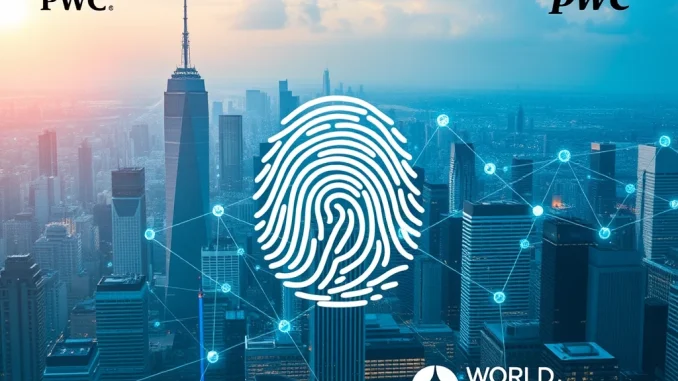
In a groundbreaking move that signals a significant leap forward for digital autonomy in Europe, PricewaterhouseCoopers (PwC) Italy is stepping into the blockchain arena to develop a cutting-edge digital identity product for the European Union. Partnering with SKChain Advisors and leveraging the innovative World Mobile Chain, PwC Italy is poised to redefine how EU citizens manage their online identities. This initiative arrives at a crucial time when data privacy and individual control are paramount concerns in the digital age. Let’s delve into how this exciting development is shaping the future of digital identity and what it means for you.
What is Self-Sovereign Identity and Why is it a Game Changer?
At the heart of PwC Italy’s new product lies the concept of Self-Sovereign Identity (SSI). But what exactly is SSI, and why is it generating so much buzz in the tech world? In simple terms, SSI is a revolutionary approach to digital identity that flips the traditional model on its head. Instead of relying on centralized entities like governments or corporations to manage and control your personal data, SSI puts you, the user, firmly in the driver’s seat.
Here’s a breakdown of why SSI is a game changer:
- User-Centric Control: SSI empowers individuals with complete control over their identity data. You decide what information to share, with whom, and for how long. No more data silos controlled by third parties.
- Enhanced Privacy: By minimizing data sharing and eliminating reliance on central repositories, SSI significantly enhances privacy. You share only what’s necessary, reducing the risk of data breaches and unauthorized access.
- Increased Security: SSI leverages cryptographic techniques and blockchain technology to secure identity data. This makes it significantly more resistant to fraud and tampering compared to traditional systems.
- Interoperability: SSI aims to create a globally interoperable identity framework. Imagine using the same digital credentials seamlessly across different platforms and services within the EU and potentially beyond.
- Reduced Reliance on Centralized Providers: SSI diminishes the power of centralized identity providers, fostering a more decentralized and democratic digital ecosystem.
PwC Italy and World Mobile Chain: A Powerful Partnership for EU Digital Identity
The collaboration between PwC Italy and SKChain Advisors, utilizing World Mobile Chain, is a strategic move that combines PwC’s extensive consulting expertise with the cutting-edge blockchain capabilities of World Mobile. World Mobile Chain, built as a layer-3 network on Coinbase’s Base, is specifically designed for scalability and efficiency, making it an ideal foundation for a robust digital identity solution.
Why World Mobile Chain? Here are some key advantages:
- Scalability: Designed to handle a massive number of transactions and users, essential for a large-scale EU-wide digital identity system.
- Low Transaction Fees: Blockchain transactions on World Mobile Chain are designed to be cost-effective, crucial for widespread adoption.
- Security: Leveraging the security features of Base and incorporating advanced cryptographic protocols to protect user data.
- Decentralization: Built on blockchain principles, ensuring a decentralized and transparent system.
- Focus on Digital Inclusion: World Mobile Chain has a broader mission of connecting the unconnected, aligning with the inclusive nature of digital identity for all EU citizens.
Blockchain: The Backbone of Secure Digital Identity
Blockchain technology is not just about cryptocurrencies; its inherent security and transparency make it a perfect fit for securing digital identity. By utilizing blockchain, PwC Italy’s solution ensures that identity data is tamper-proof, verifiable, and auditable.
Here’s how blockchain enhances digital identity security:
- Immutable Records: Once data is recorded on a blockchain, it cannot be altered or deleted, providing a permanent and trustworthy record of identity information and verifications.
- Decentralized and Distributed Ledger: Data is not stored in a single location, but distributed across a network of computers, making it extremely difficult for hackers to compromise the entire system.
- Cryptography: Blockchain uses advanced cryptography to secure transactions and data, ensuring confidentiality and integrity.
- Transparency and Auditability: While user data remains private, the transactions and processes on the blockchain are transparent and auditable, enhancing trust in the system.
EU Digital Identity: A Unified Approach for a Digital Europe
The European Union has been actively promoting the development of a unified digital identity framework to streamline online interactions and services across member states. PwC Italy’s initiative aligns perfectly with this vision, contributing to the creation of a more cohesive and efficient digital ecosystem within the EU. A robust EU digital ID system can unlock numerous benefits for citizens and businesses alike.
Benefits of a Unified EU Digital ID:
| Benefit | Description |
| Seamless Cross-Border Services | Access public and private services across EU member states using a single, recognized digital identity. |
| Simplified Online Processes | Streamline online applications, registrations, and transactions, reducing bureaucracy and paperwork. |
| Enhanced Security and Trust | Reduce fraud and identity theft with a secure and verifiable digital identity system. |
| Increased Efficiency for Businesses | Simplify customer onboarding, KYC (Know Your Customer) processes, and cross-border transactions. |
| Greater Citizen Empowerment | Give citizens more control over their personal data and how it is used online. |
Challenges and Future of Blockchain-Based Digital Identity
While the potential of blockchain-based digital identity is immense, there are challenges to overcome for widespread adoption. Scalability, interoperability between different blockchain platforms, regulatory frameworks, and user education are crucial aspects that need careful consideration. However, the momentum is building, and initiatives like PwC Italy’s demonstrate the growing confidence in blockchain as a foundational technology for secure and user-centric digital identity.
Looking ahead, we can expect to see:
- Increased Standardization: Efforts to establish common standards for digital identity frameworks to ensure interoperability and seamless integration across different systems.
- Growing Adoption by Governments and Businesses: More governments and businesses will explore and implement blockchain-based digital identity solutions to enhance security, efficiency, and user experience.
- Focus on User Experience: Making digital identity solutions user-friendly and accessible to everyone, regardless of their technical expertise.
- Integration with Emerging Technologies: Exploring the synergy between digital identity and other technologies like AI and IoT to create even more powerful and versatile solutions.
Conclusion: Embracing the Revolutionary Power of Digital Identity
PwC Italy’s venture into blockchain-based digital identity for the EU is a powerful testament to the transformative potential of this technology. By prioritizing self-sovereign identity and leveraging the robust capabilities of World Mobile Chain, they are paving the way for a future where individuals have greater control, security, and privacy in their digital lives. As the EU continues to push for a unified digital framework, initiatives like this are not just innovative projects; they are crucial steps towards realizing a truly empowered and connected digital society. The revolution in digital identity is underway, and it’s powered by the secure and transparent promise of blockchain.



